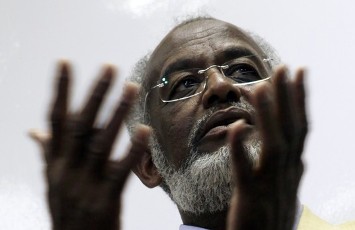Karti says Arab countries have misperception of situation in Sudan
May 24, 2014 (KHARTOUM) – The Sudanese foreign minister Ali Karti expressed regret over what he described as the misperception of his country by Arab states that led to a decline in investments flowing from that part of the world.

Karti went on to say that there is a lack of focus on the need for giving attention to Sudan by some Arab countries recalling that Sudan has always emphasised that it is being subjected to a conspiracy in its southern parts which was confirmed later by the secession of South Sudan.
“Unfortunately, all the Arab countries were preoccupied with other parties outside the region and did not give enough attention to Sudan which could have helped keep Sudan united,” he said.
South Sudanese voted overwhelmingly in favor of secession in a referendum held in January 2011, and the world’s newest nation, after its independence in July of the same year, quickly became the 193rd member of the United Nations and 54th member of the African Union.
Sudan was the first country to recognise South Sudan’s independence and president Omer Hassan al-Bashir attended the independence celebrations.
Many Arab officials privately accuse the Sudanese government of giving up the south too easily and adopting policies which led to this situation.
The Sudanese top diplomat said that Arab countries are not offering his country enough aid given that Sudan is under comprehensive US economic sanctions.
He emphasised that Arab investments did not reach a level that could convince people that Arab countries are serious about investing in Sudan .
“Some of them have convictions and illusions that the state of security in Sudan is not what it should be. I do not blame the Arabs, but I invite them to review their decisions on economic partnerships with Sudan,” Karti said.
He said that Arab nations should rid themselves of doubts and suspicions and adopt a more positive view to utilise Sudan’s resources through large partnerships.
Karti reiterated that Sudan’s ties with Iran are normal and not special with public cooperation in known military aspects.
In a separate interview with al-Sudani newspaper published this week, Karti acknowledged tensions with Arab Gulf states of Saudi Arabia and the United Arab Emirates (UAE) over relations with Iran and presumption that Sudan backs the International Organization of the Muslim Brotherhood.
He criticised local media and even the Sudanese army for overstating the issue of docking of Iranian warships in Port Sudan which appeared to concern these countries.
Karti also denied that Sudan is an issue of dispute between Qatar and its neighbours.
Qatar is one of the main political and economic backers of Sudan’s Islamist government and has hosted Darfur peace talks which resulted in a peace accord signed in 2011 known as the Doha Document for Peace in Darfur (DDPD) between Khartoum and Liberation and Justice Movement (LJM) headed by Tijani el-Sissi.
A diplomatic fallout occurred between Qatar and other Gulf states, including UAE, Saudi Arabia and Bahrain after they accused Doha of failing to abide by an accord not to interfere in each others’ internal affairs.
Karti blasted the US for reneging on promises to remove Sudan from terrorism list and help it cancel its debts if it signs peace deals in Naivasha and Abuja related to conflicts in the south and Darfur.
“America does not control itself , but is governed by a range of interests that are not consistent with the presence of Sudan on the list of countries deserving of life, and the US with its weight is the biggest disavower and there are countries that are affected by its policies,” Karti said.
Karti said that the South Sudan ongoing conflict has made thousands of southerners flee to Sudan, noting that oil production has stopped completely in the Bentiu field with threats, to the remaining field.
“We hope that oil is not a site of conflict because the needs of the fields are affected by border safety,” he said.
Khartoum gets a fixed fee from Juba for every barrel of oil exported through its pipelines which helps it cover a portion of its budget hole and more importantly provides a stable source of hard currency needed to import food.
Karti pointed out that the Sudan, despite its complaint on Juba’s hosting of anti-Khartoum insurgents, is working to further peace efforts through African mediation and opening borders for humanitarian aid.
(ST)
